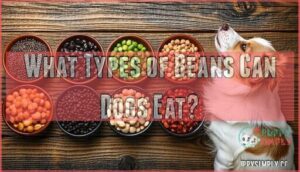This site is supported by our readers. We may earn a commission, at no cost to you, if you purchase through links.

Skip the canned varieties – they’re loaded with sodium and preservatives that aren’t dog-friendly. Instead, cook plain beans from scratch without any seasonings, garlic, or onions.
Think of kidney beans as an occasional treat rather than a meal replacement, since dogs need balanced nutrition from their regular food. While they’re safe when prepared correctly, moderation is key – too many beans can cause digestive upset.
The secret lies in knowing which preparation methods work best, to ensure your dog can enjoy kidney beans without any issues.
Table Of Contents
- Key Takeaways
- Can Dogs Eat Dark Red Kidney Beans?
- The Nutritional Benefits of Dark Red Kidney Beans
- What Types of Beans Can Dogs Eat?
- What Types of Beans Are Not Safe for Dogs to Eat?
- Can Dogs Substitute Beans for Meat as a Protein Source?
- Safely Preparing Dark Red Kidney Beans for Dogs
- Are Dark Red Kidney Beans Poisonous to Dogs?
- Frequently Asked Questions (FAQs)
- Can dogs eat kidney beans & rice?
- Are red kidney beans toxic to dogs?
- Can dogs eat black beans?
- Can dogs eat canned red beans?
- Can kidney beans cause pancreatitis in dogs?
- How many kidney beans should a dog eat a day?
- Can dogs have canned dark red kidney beans?
- Are canned dark red kidney beans cooked?
- What beans can dogs not eat?
- What are some dog-friendly bean recipes I can make at home?
- Conclusion
Key Takeaways
- You shouldn’t feed your dog raw or undercooked dark red kidney beans because they contain toxic lectins that can cause severe digestive upset and potentially life-threatening kidney problems.
- You can safely give your dog thoroughly cooked kidney beans as an occasional treat, but you’ll need to cook them from scratch without any seasonings, garlic, or onions – skip the canned varieties due to high sodium content.
- You should treat kidney beans as a supplement, not a protein replacement, since they don’t provide the complete amino acid profile your dog needs from meat-based sources.
- You’ll want to introduce cooked kidney beans gradually in small portions (1-2 tablespoons) and watch for any adverse reactions like vomiting or diarrhea within 24 hours, to ensure your dog can tolerate them as an occasional treat and doesn’t experience severe digestive upset.
Can Dogs Eat Dark Red Kidney Beans?
You might wonder if your dog can safely munch on those dark red kidney beans from your pantry, especially when they’re giving you those hopeful eyes during dinner prep.
The short answer is no – dogs shouldn’t eat dark red kidney beans because they contain lectins, which are natural toxins that can cause serious digestive problems and even kidney issues in your furry friend.
Can Dogs Eat Canned Dark Red Kidney Beans?
Canned kidney beans aren’t your best bet for Fido. While technically safe in small amounts, canned varieties pack serious sodium content concerns that can spell trouble for dogs with heart conditions.
Those preservatives and additives create unnecessary canned bean risks. Kidney beans can offer nutritional benefits, as cooked beans are healthy.
- Rinse thoroughly – Always wash canned beans to reduce sodium before serving
Choose fresh alternatives instead for safer serving sizes.
Can Dogs Eat Cooked Dark Red Kidney Beans?
Cooking kidney beans substantially reduces lectins, but it doesn’t eliminate all risks.
While cooked kidney beans are safer than raw ones, they can still cause digestive upset in sensitive dogs.
The lectin reduction through proper cooking offers some benefits, but portion control remains critical.
Even small amounts might trigger stomach issues.
For your dog’s digestive health, consider bean alternatives like green beans or carrots instead.
These safer options provide nutrition without the kidney bean concerns.
The Nutritional Benefits of Dark Red Kidney Beans
Dark red kidney beans pack impressive nutritional benefits that can boost your dog’s health when properly prepared.
These protein-rich legumes offer several advantages:
- Fiber and Digestion: High fiber content promotes healthy bowel movements and supports digestive system regulation
- Antioxidant Benefits: Natural compounds help protect cells from damage while supporting overall wellness
- Mineral Content: Rich in iron, phosphorus, magnesium, and potassium for strong bones and muscles
Additionally, kidney bean benefits dogs through Vitamin K for blood clotting and plant-based protein.
However, proper cooking remains essential for safety.
What Types of Beans Can Dogs Eat?
While kidney beans need careful consideration, several bean varieties make excellent dog-friendly treats when properly prepared.
Your pup can safely enjoy these nutritious options:
- Black beans – packed with protein, fiber, and essential vitamins
- Green beans – can be served raw or cooked, perfect for weight management
- Pinto beans – rich in B vitamins and easy to digest when cooked
Always serve beans plain and cooked (except green beans).
Beans can offer significant nutritional benefits for your dog.
Start with small serving sizes to test your dog’s tolerance.
These bean alternatives provide excellent nutritional benefits while keeping your furry friend safe and satisfied.
What Types of Beans Are Not Safe for Dogs to Eat?
While many beans offer nutritional benefits for dogs, several varieties pose serious health risks that you’ll want to avoid completely.
Raw bean dangers top the list of concerns. Kidney bean toxicity occurs when dogs consume uncooked or undercooked varieties containing high lectin toxicity levels. These toxic foods for dogs can trigger severe vomiting, diarrhea, and potentially life-threatening complications.
Broad bean risks include canavanine compounds that damage red blood cells. Chili bean concerns stem from spicy seasonings that irritate your dog’s digestive system. Coffee bean issues involve dangerous caffeine levels that can cause heart problems and seizures.
Unsafe bean types also include fava beans and any seasoned varieties with garlic or onion powder. To mitigate these risks, soaking beans overnight is recommended before cooking. The lectin toxin in these beans to avoid can cause serious intestinal inflammation, making prevention your best strategy for keeping your furry friend healthy.
Can Dogs Substitute Beans for Meat as a Protein Source?
Despite their nutritional value, kidney beans for dogs can’t replace meat as your pup’s primary protein source.
Here’s the reality: beans for dog diet lack the complete amino acid profile that meat provides.
Your dog’s digestive system evolved to process animal proteins efficiently, making bean digestibility substantially lower than meat alternatives.
While protein comparison shows beans contain decent protein levels, they’re missing essential amino acids like taurine that keep your dog healthy.
Meat alternatives from plants simply don’t match what your carnivorous companion needs.
Think of beans as a side dish, not the main course.
Dog nutrition beans work best as occasional supplements alongside high-quality commercial food.
Your dog’s supplementation needs are complex, requiring balanced nutrition that only complete dog foods provide.
Protein sources should remain primarily meat-based for ideal health and energy.
Safely Preparing Dark Red Kidney Beans for Dogs
Proper bean preparation can make all the difference between a healthy treat and a trip to the vet. Start by choosing the right cooking methods – always soak dried dark red kidney beans overnight, then boil them vigorously for at least 30 minutes.
This soaking duration and thorough cooking process eliminates lectin, the toxic compound that makes raw kidney beans dangerous. If you’re using canned cooked kidney beans, rinse them thoroughly to remove excess sodium.
Consider exploring options for safe bean cooking to guarantee digestibility. In the context of serving size, think small – just one to two tablespoons mixed into your dog’s regular food.
Gradual introduction is key; start with even smaller amounts to gauge your pup’s tolerance. Watch carefully for adverse reactions like vomiting, diarrhea, or stomach discomfort during the first 24 hours.
Remember, kidney beans for dogs should only be an occasional treat, not a dietary staple.
Are Dark Red Kidney Beans Poisonous to Dogs?
Raw dark red kidney beans pack a dangerous punch due to lectin toxicity from phytohaemagglutinin, a potent lectin toxin that can trigger severe gastrointestinal upset in your pup.
This bean toxicity affects all breeds, though some show greater breed sensitivity than others.
Cooking effects eliminate most dangers—proper boiling destroys these harmful compounds completely.
If your dog accidentally munches raw beans, immediate actions include contacting your vet and monitoring for vomiting or diarrhea. Consider safe alternatives like green beans or cooked black beans for healthier treats.
Frequently Asked Questions (FAQs)
Can dogs eat kidney beans & rice?
Walking on thin ice here—kidney beans can spell trouble for your furry friend.
They’re packed with toxic lectins that cause serious digestive upset.
Rice is safe, but skip the beans entirely.
Are red kidney beans toxic to dogs?
Yes, red kidney beans are toxic to dogs, especially when raw or undercooked.
They contain lectins and hemagglutinin, which cause severe gastrointestinal upset and potential kidney failure.
You should avoid feeding them entirely to prevent kidney failure.
Can dogs eat black beans?
Like finding a diamond in the rough, black beans are actually safe for your dog when properly cooked.
They’re packed with protein and fiber, but serve them plain and in moderation.
Can dogs eat canned red beans?
Canned red beans aren’t safe for your dog.
They’re packed with sodium, preservatives, and lectins that can cause digestive upset or kidney issues.
Skip the canned variety and choose safer, plain-cooked alternatives instead.
Can kidney beans cause pancreatitis in dogs?
Kidney beans don’t directly cause pancreatitis in dogs, but their high lectin content can trigger severe digestive upset.
You’d want to avoid them entirely since gastrointestinal inflammation could potentially worsen existing pancreatic conditions, which is a key reason to be cautious with gastrointestinal inflammation.
How many kidney beans should a dog eat a day?
Zero kidney beans per day is the safest number for your dog.
Even one cooked kidney bean can trigger digestive upset in sensitive pups, so it’s better to skip them entirely and choose safer bean alternatives.
Can dogs have canned dark red kidney beans?
You shouldn’t give your dog canned dark red kidney beans.
They’re loaded with sodium and preservatives that can upset your pup’s stomach, plus kidney beans contain lectins that are toxic to dogs.
Are canned dark red kidney beans cooked?
Here’s the surprising truth you’ve been wondering about: yes, canned dark red kidney beans are fully cooked during processing.
They’re heated to high temperatures, making them safe from raw toxins that’d harm your pup, specifically because they are fully cooked.
What beans can dogs not eat?
You’ll want to avoid giving your dog raw kidney beans, broad beans, chili beans, coffee beans, and canned beans with high sodium.
These contain toxic compounds like lectins, caffeine, or harmful additives that can cause serious health issues.
What are some dog-friendly bean recipes I can make at home?
Nearly 70% of dog owners now prepare homemade treats for their pets.
You can make simple green bean "chips" by dehydrating fresh beans, or mix cooked black beans into homemade dog biscuits for extra protein and fiber.
Conclusion
Surprisingly, kidney beans contain nearly 15 grams of protein per cup, making them a nutritious addition to your dog’s diet when prepared properly.
You’ve learned that dogs can eat dark red kidney beans safely, but only when they’re thoroughly cooked and served plain.
Remember to avoid canned varieties and always introduce beans gradually to prevent digestive issues.
With proper preparation and moderation, these protein-rich legumes can become a healthy occasional treat for your furry friend.










